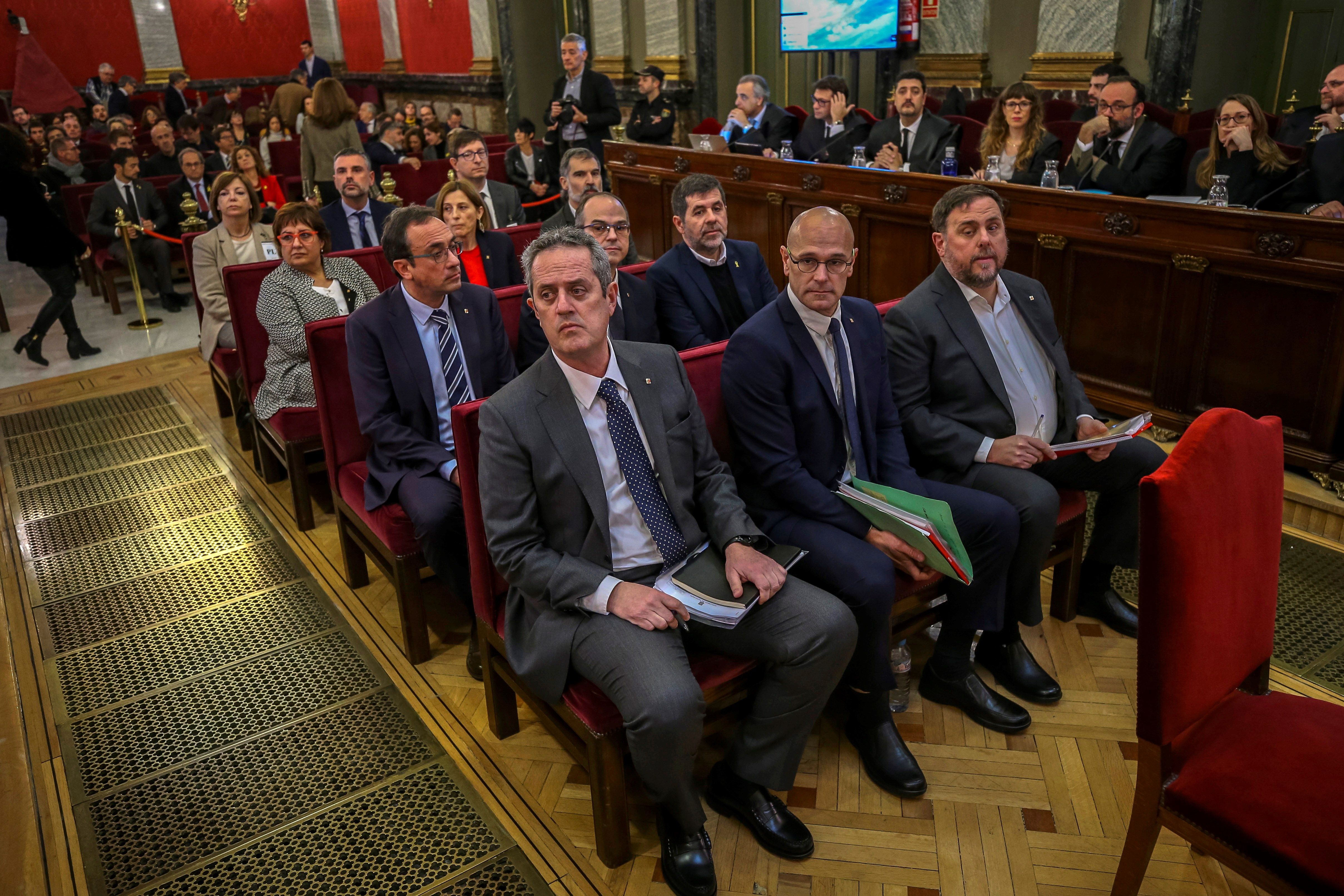Spain's Supreme Court has announced its verdicts in the Catalan referendum trial. Former Catalan vice-president Oriol Junqueras is sentenced to 13 years in prison and is banned from holding public office for the same length of time for the crimes of sedition. Sedition, as defined in Spanish law, is different to how we understand the word in general English. It means the court has found them guilty of "rising up publicly and tumultuously" against the law and/or the authorities.
Former Catalan Parliament speaker Carme Forcadell, civil society leaders Jordi Sànchez and Jordi Cuixart, and former Catalan government ministers Jordi Turull, Raül Romeva, Dolors Bassa, Josep Rull and Joaquim Forn have been found guilty of the same crime and face between nine and 12 years in jail each. Oriol Junqueras, Raül Romeva, Jordi Turull and Dolors Bassa have also been convicted of misuse of public funds.
The remaining three Catalan government ministers on trial, Santi Vila, Meritxell Borràs and Carles Mundó, have been found guilty of disobedience but will not enter prison.
Full details of the sentence for each defendant.
The announcement had been expected around midday, but ended up being brought forward to 9:30am local time after leaks over the weekend. Three court clerks had earlier arrived at Lledoners, Puig de les Basses and Mas d'Enric prisons with the sentences on memory drives, where the prisoners were waiting for the decision with their lawyers. Their lawyers, that is, apart from Andreu van den Eynde, in Luxembourg today where the European Court of Justice will hear a case on Oriol Junqueras' MEP immunity.
The sentences mean the defendants are acquitted of the most serious charge they faced, that of rebellion. The judges state that they "take as proven the existence of violence", but that "there is not enough evidence of inarguable episodes of violence to proclaim the events as constituting a crime of rebellion".
The trial
The trial itself started on 12th February in the Supreme Court in Madrid. It was one of the biggest and most important in Spain since the restoration of democracy at the end of the 70s, a fact reflected in the numbers: 12 defendants, three teams of prosecutors (including one from a far-right political party), seven judges, over 400 witnesses and four months of hearings.
Another number: 15 months. That's how long civil society leaders Jordi Sánchez and Jordi Cuixart, the presidents of ANC and Òmnium respectively, had spent in pretrial detention by the time they arrived in court in February. Behind bars for nearly as long had been politicians Oriol Junqueras, Catalan vice-president, and Joaquim Forn, interior minister; former speaker of the Catalan Parliament Carme Forcadell and government ministers Raül Romeva, Jordi Turull, Josep Rull and Dolors Bassa had each served around a year in total. Only the former ministers Carles Mundó, Meritxell Borràs and Santi Vila were not incarcerated.
The events of 2017
The trial was based around events that occurred in autumn 2017 as part of Catalonia's push for independence. The key dates were:
- 6th and 7th September: Catalan Parliament passes laws for the referendum and to govern what was meant to happen afterwards.
- 17th September: Spain's Constitutional Court annuls the Referendum Law, finding Catalonia does not have the right to self-determination.
- 20th September: Spain's Civil Guard detain 14 high-ranking government officials and spend hours searching different ministries as a large crowd builds outside in protest.
- 1st October: The referendum is held. Spain's Civil Guard and National Police Corps use force at some polling locations to try and prevent the vote.
- 27th October: With Sànchez and Cuixart already in custody, the Catalan Parliament votes to declare independence. Mariano Rajoy's government in Madrid takes direct control over Catalonia through article 155 of the Spanish Constitution.
Full details in our timeline of events leading up to the trial.
The exiles
Not everyone charged in the case was in the dock. When delivered their initial summonses to court in October 2017, the Catalan government split into two camps: some decided to go to court in Madrid, others decided to leave for Brussels. President Carles Puigdemont and ministers Toni Comín, Clara Ponsatí, Meritxell Serret and Lluís Puig have since then been living abroad in exile.
Spanish judges had tried to get the five extradited twice. The first time, they withdrew the arrest warrants early in the process. The second time, Belgium refused to extradite Serret, Puig and Comín arguing there was an error in the application, whilst a court in Schleswig-Holstein, Germany rejected extraditing Puigdemont over rebellion and was considering the charge of misuse of public funds. At that point, investigating judge Pablo Llarena withdrew the European Arrest Warrants against them again. It is widely expected that, after today's verdicts in the trial of their colleagues, Spain will attempt to extradite Puigdemont and his ministers for a third time.
The verdict
In their argument for sedition, the judges argue that "the political, individual or collective defence" of independence "does not constitute a crime." However, they add, a crime is constituted by "mobilizing citizenry in a public and tumultuous uprising that, in addition, prevents the application of laws and prevents compliance with judicial decisions."
In the nearly 500 pages of the sentence document, the court accepts as proven the existence of violence during the independence process, although not sufficient to rank as "rebellion". It states that the convicted civil and political leaders organized a strategy together, with division of functions across "parliamentary, executive and civil organs", which involved making Catalans believe that "when they deposited their vote they would be contributing to the founding act of the independent Republic of Catalonia."

